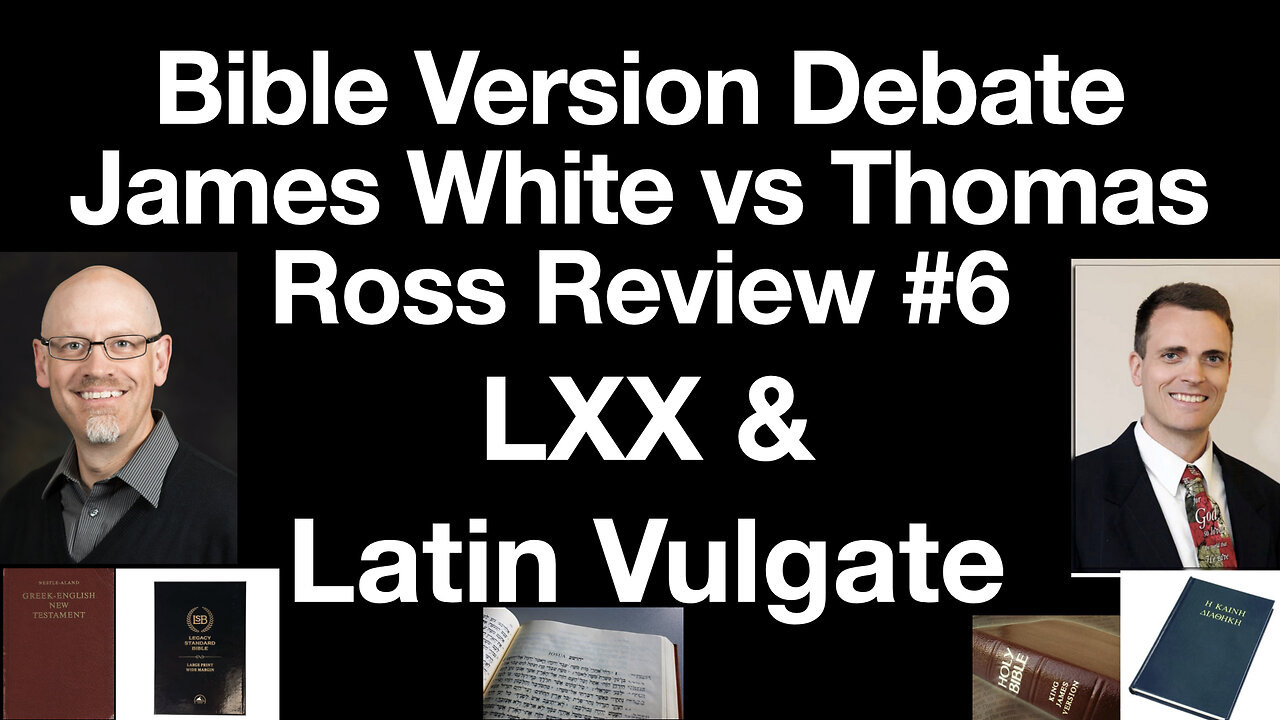Premium Only Content

James White and Thomas Ross Debate Review #6: the LXX (Septuagint), Latin Vulgate & KJV Translators
Part six in this series of debate review videos by Thomas Ross of the arguments made by both sides in the James White / Thomas Ross King James Version Only debate reviews James White's claim that the King James Version translators would prefer modern versions to the King James Bible in in relation to what the "Translators to the Reader" says about the LXX or Septuagint and the Latin Vulgate.
The statements in the KJV's "The Translators to the Reader" concerning the LXX fit exactly with what Thomas Ross said about the Septuagint in the debate, and exactly contradict James White's claims. Dr. White claimed that "the King James translators would be completely on my side in the debate” (10:00-12:00). However:
1.) The KJV preface argues, from Apostolic practice, for not altering or amending even translations that have serious issues, based on the examples of the Holy Ghost and the Apostles. According to the KJV translators, even if modern translators know more about the Hebrew and Greek words for various flowers and rocks than did the KJV translators, the conclusion that Christians should give up the KJV for the LSB would not follow.
2.) James White had argued in the debate that the New Testament rejects the testimony of the Hebrew text in passages such as Hebrews 8:9 and Hebrews 10:5 to follow the LXX against the Hebrew text, contradicting Christ’s promise of Matthew 5:18. The allegation of White that the New Testament quotes the LXX even when the Septuagint mistranslates the Hebrew is important enough for a separate debate review video. Note at this point, however, that the KJV translators and the preface to the KJV took exactly the same position as Thomas Ross, and specifically repudiate what White argued. The KJV preface said that the Apostles had the Hebrew text as their final authority and rejected the LXX to follow the Hebrew whenever the two differed. So how does this fact work with Brother White’s astonishing claim that the KJV translators would be “completely” on his side in our debate, based on the KJV preface?
The KJV "Translators to the Reader" notes: "The translation of the Seventy dissenteth from the Original in many places, neither doth it come near it for perspicuity, gravity, majesty[.] …They [the LXX translators] did many things well, as learned men; but yet as men they stumbled and fell, one while through oversight, another while through ignorance; yea, sometimes they may be noted to add to the original, and sometimes to take from it: WHICH MADE THE APOSTLES TO LEAVE THEM MANY TIMES, WHEN THEY LEFT THE HEBREW, and to deliver the sense thereof according to the truth of the word, as the Spirit gave them utterance."
Is there any reason to deny that the Apostles used the LXX when it was accurate? There is no reason believers in perfect preservation should deny this. But note that the KJV translators took the same position as Thomas Ross and KJV-Only perfect preservationists on this issue—they recognized that the Apostles could have quoted the LXX when it was an accurate translation of the Hebrew, but whenever the LXX differed from the Hebrew, Hebrew was always the authority. The Apostles never quoted the LXX when it mistranslated the Hebrew. That is what Scripture teaches in Matthew 5:18, it is what the KJV translators believed as documented in the preface, and it is what Dr. Ross argued for in the debate, while Dr. White argued for exactly the opposite, and by thinking he had a “gotcha” moment on me, gave reason to question whether he had ever seriously grappled with the case against what he was arguing.
Discussing the multiplicity of ancient Latin translations-when Latin was actually a vernacular language-the KJV translators said the vernacular “translations were too many to be all good, for they were infinite.” Does that not sound exactly like the situation with modern English Bible versions? Are there not far more modern English Bible versions today than there were Latin translations in Augustine’s day? Exactly what James White defends is condemned by the KJV translators. According to the KJV translators, it is possible to have “translations … too many” in one language. Of course, this also fits perfectly with their expressed intention for the KJV to be THE church Bible, the only Bible used in church, and the Bible which would supersede all others in English as the best English version.
Also, the Latin Vulgate is considerably closer to the Textus Receptus than it is to the modern Nestle-Aland text (inaccurate claims by the Seventh Day Adventist cultist Benjamin Wilkinson to the contrary notwithstanding). The Latin Vulgate contains Mark 16:9-20; John 7:53-8:11; Acts 8:37 & 1 John 5:7. Houghton’s standard introduction to the Latin New Testament, by Oxford University Press, states: “[T]he Vulgate … [is] clos[e] to the later standard (koine or Byzantine text) … It was once thought that Jerome’s Greek text was similar to Codices Sinaiticus and Vaticanus, but this is no longer the case.”
-
 19:56
19:56
GritsGG
12 hours agoSpectating Random Solo Players in a Bot Lobby!
1.82K1 -
 LIVE
LIVE
Lofi Girl
2 years agoSynthwave Radio 🌌 - beats to chill/game to
227 watching -
 16:22
16:22
BlabberingCollector
2 days agoHarry Potter HBO: Addressing Some New Rumors!
2.29K1 -
 4:01:30
4:01:30
Badlands Media
20 hours agoThe Narrative Ep. 37: The Sovereign War
174K32 -
 11:23:54
11:23:54
SpartakusLIVE
12 hours agoMega SOLO Spartan Stream - 12 hours?! HA || Variety Later?!
103K -

Rallied
5 hours ago $19.00 earnedSolo Warzone Challenges All Night
45.7K3 -
 4:53:38
4:53:38
Due Dissidence
15 hours agoTaibbi DEFENDS Weiss-CBS Deal, Pakman Producer SPILLS TEA, Massie CALLS OUT Trump Informant Claims
29.9K36 -
 2:33:47
2:33:47
TheSaltyCracker
8 hours agoMedia Silent on Metro Attack ReeEEStream 9-07-25
148K274 -
 56:27
56:27
Sarah Westall
8 hours agoEnd of Aging, Hydrogen Bomb Research, Serial Killers & Violent Behavior, Bipolar Research w/Dr Walsh
40.2K6 -
 4:36:53
4:36:53
MattMorseTV
10 hours ago $17.56 earned🔴Sunday Gaming🔴
72.4K5